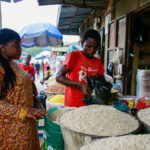Violence against the female gender- women and girls – was hitherto difficult to deal with because of the lack of sufficient laws and stigma attached to them. Not anymore.
Before these legal reforms, many forms of violence against women were overlooked or normalised by society and therefore went unpunished. The deepening of these vices in the society, at a time the rest of the world has advanced beyond them, can also be attributed to their acceptance by the victims themselves.
Some of the acts of violence include: defilement of minors, rape, female genital mutilation, forceful ejection from home, forced financial dependence/economic abuse, emotional, verbal and psychological abuse, harmful widowhood/traditional practices, spousal abandonment, incest, political violence and violence by state actors.
The United Nations views gender-based violence (GBV) or violence against women and girls (VAWG) as a global pandemic that affects 1 in 3 women in their lifetime.
For this reason, the International Federation of Women Lawyers (FIDA) organised a one-day workshop in Abuja to highlight the available national laws and international conventions which protect women from violence.
According to the National Secretary of FIDA, Rhoda Tyorden Moore, who represented the National president of FIDA, Inime Aguma, besides the Administration of Criminal Justice Act (ACJA, 2015), which has provisions against rape, assault and others, there is now Violence Against Persons (Prohibition Act) (VAPP, 2015).
“The definition of ‘Rape’ under the VAPP has now been expanded and the offender will go to prison for the rest of his/her life. He/she will also pay the affected person some money for what he/she has done,” Moore said.
Before these new laws, there was also the Trafficking in Persons (Prohibition) Enforcement and Administration Act 2003, the Criminal Code Act, and the provisions of Chapter II, sections of 2 and 17; and Chapter IV, Section 34 of the 1999 Constitution of Nigeria. Also, enforcements against these vices have become stronger.
FIDA Programme Manager, Subomi Chuku, identified the available laws on the international front. They include: The United Nations sponsored Convention for the Elimination of Discrimination Against Women (CEDAW) of 1979, and the International Convention on the Elimination of All Forms of Racial Discrimination, 1967. There is the African Charter on Human and Peoples Rights (domesticated); The African Protocol on Human and Peoples’ Rights on the Rights of Women in Africa (Maputo Protocol).
Further, there is the International Covenant on Civil and Political Rights, the Convention on the Rights of the Child (domesticated as the Child Rights Act Law in 24 states); Declaration of Basic Principles of Justice for Victims of Crime and Abuse of Power, and the Universal Declaration of Human Rights.
In a presentation at the workshop on the Prevention and Elimination of Violence Against Women and Girls, the FIDA Programme Officer, Ifeanyi Iloba, further explained that 35% of women worldwide have experienced either physical and/or sexual intimate partner violence or non-partner sexual violence, while 200 million have experienced genital mutilation.
According to Iloba, globally, 7% of women have been sexually assaulted by someone other than a partner, while up to 38% of murders of women are committed by an intimate partner.
Citing as UN report, he said African women are most at risk of violence, adding that 23 percent of women have been victims of physical or sexual violence committed by a previous husband.
On women trafficking, he quoted a Journal of Sociology and Social Policy report that of the over 70,000 African victims of women trafficking, Nigeria accounts for 70% of those trafficked to Italy alone.
“As of December 2017, 36,312 migrants stranded in Niger and Libya indicated Nigeria as their country of Origin (IOM). According to IOM, as of July 2018, over 60,0000 Nigerians remain trapped in Libya, with 50% of them hailing from Edo State. 90% of migrant women arriving into Italy from Libya arrive with bruises and other signs of violence.
“Human trafficking is the third most common crime in Nigeria after drug trafficking and economic fraud (UNESCO, 2016).
“NAPTIP further contends that 75% of those who are trafficked within Nigeria are trafficked across states, while 23% are trafficked within states. Only 2% are trafficked outside the country (NAPTIP, 2016).
Highlighting the factors underlying violence against women, Iloba listed power hierarchies, anti-social personality disorder, harmful use of alcohol, lower levels of education, community norms that privilege or ascribe higher status to men and lower status to women; and low levels of women’s access to paid employment.
Others are: marital discord and dissatisfaction, difficulties in communicating between partners, gender inequality – in education, access to employment, economic and property rights, freedom to marry and divorce.
Because of the relevance of law enforcement in investigation and prosecution of women rights’ violations, the need for sensitization, increased funding and equipping of gender sections of relevant agencies such as Nigeria Police, NAPTIP, Nigerian Security and Civil Defence Corps (NSDC), state ministries of justice, National Human Rights Commission (NHRC), Ministry of Health etc was enphasised.
According to Chuku, the changes in law enforcement must include a development of Standard Operation Protocols (SOP), quickening of response time- to secure evidence such as medical tests, and greater synergy among agencies.
Indeed, trainings such as this organised by FIDA can help break the culture of silence and stigma surrounding issues of violence against women, and help to create a saner society.

 Join Daily Trust WhatsApp Community For Quick Access To News and Happenings Around You.
Join Daily Trust WhatsApp Community For Quick Access To News and Happenings Around You.



